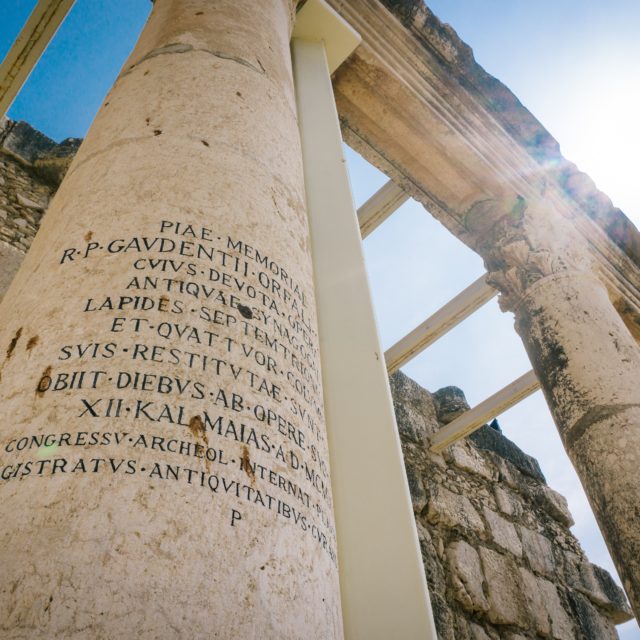What we find fascinating is that the ancient Greeks were leaders in holistic thinking – viewing the world from an integrated point of view, not just looking at the parts or events of our lives as being separate. They believed that nothing and no one was separate, that everything was connected. They were ahead of their time with their insights into the integration of body, mind, and spirit. (Much later, the body and mind were viewed as separate entities, leading to what we believe are many of the issues we face in the pursuit of well-being today.)
CONNECT MEANINGFULLY WITH OTHERS
“Man is a social animal.” – Aristotle
Aristotle believed that we are gregarious beings who flourish in groups or communities. Importantly, it is our nature to belong. Today, we live in a global world but, despite our social media connectivity, our emailing and our texting, research has shown that many people feel increasingly alienated. Depression, anxiety, and addiction are all on the rise, leading to a general decline in well-being.
A related challenge we face today is that, instead of relying on those we know for the necessities of life, we’re dependent on strangers and institutions for our survival. We don’t barter with neighbors, or even know where our food comes from; instead, we shop at supermarkets. We don’t depend on others for information or advice; we turn to the Internet. At the same time, we’re also more independent; rather than borrow things from our neighbors, we simply buy our own. Instead of asking others to help us, we do the chore ourselves or hire professionals. What have we lost? Have we tried so hard to be self-sufficient that we have cut ourselves off from each other?
Ancient and modern Greeks have much to share about connecting meaningfully with others. They teach us that we’re all important participants in the different “villages” in our lives, whether that village is our family, our friends or coworkers, or a larger organization. Greeks teach us to extend hospitality to others and always include them – “there is always room for one more.”
SHARING AND CARING
“We should look for someone to eat and drink with before looking for something to eat and drink.” – Epicurus
Throughout Greece, building relationships through conversation is an integral part of daily activity. Stopping to greet others acknowledges their presence – their human existence – and tells them they’re an important part of the “village.”
It’s about the conversation and the connection. The cashier in the local grocery store in the town of Chania, Crete, engaged in a long conversation with a young woman in front of us in line; she takes an interest in her customers as people, not just as business transactions.
Every interaction is an opportunity to strengthen or weaken connections with others. In no small way, the depth of our lives depends on the depth of our relationships with others. This is an important part of the Greek way of living.
EMBRACE LIFE WITH ZEST
“The sun is new each day.” – Heraclitus
The ancient Greeks taught us that life is short and ever-changing. Importantly, the need to embrace the fullness of life – all its ups and downs, joys and sorrows – with gusto and an appreciation for being alive is built into the Greek DNA. Indeed, to be “enthusiastic” about life means, literally, to manifest the spirit within!
Greece could lead the world in teaching a holistic approach to well-being. Taking good care of spirit, mind, and body is ingrained in the culture. Greeks know that life is about energy, and well-being is about keeping this important life energy flowing. We can all adopt the essence of the Hippocratic Oath, to “do no harm,” by replacing inactivity, excessive stress, overeating and eating poor quality foods, with healthier choices.
In times of crisis and undue stress, where we are struggling or lacking fulfillment, we need to go back to the basics in life and search for sources of true meaning and well-being. As Heraclitus taught us, the sun is new each day. Every day is a new chance to connect meaningfully with others, find a deeper purpose, and embrace life fully. It’s a new opportunity to follow the Greek path to well-being.
QUESTIONS AND ANSWERS
“I am not alone in my fear, nor alone in my hope, nor alone in my shouting.” – Nikos Kazantzakis (author, Zorba the Greek)
The famous Greek saying “Know thyself” is inscribed on a plaque above the entrance to the Temple of Apollo at Delphi, a sacred place where ancient Greeks came to seek guidance. Their questions were answered by Pythia, the priestess of the Greek god Apollo, but her answers were usually cryptic and open to interpretation. Once the visitor received an answer from Pythia, the challenge was what to do with the answer. Should they blindly follow her advice, believing they had received “the answer,” or was the inscription “Know thyself” a warning to decide the validity of the answer for oneself?
In his speech defending himself at his trial, Socrates described how he would, like Heraclitus, go within and listen to his inner voice to discover the “right” thing to do. His approach was clearly metaphysical; he combined logic and reason with intuition, consulting what we refer to as his “inner oracle.” Like Socrates, the challenge for many of us is whether to trust our inner oracle, our sense of inner knowing, or whether to allow ourselves to be swayed by others.
BE TRUE TO YOURSELF
“There is one life for each of us: our own.” – Euripides
The ancient Greeks taught us to always act in accordance with our true nature. In the final analysis, the greatest challenge in our life is to discover and embrace our core essence. Many people tend to focus on what job or career they think they should have, or how they might define their overall purpose in life. However, in actuality, a truly meaningful life starts from, remains engaged with, and, ultimately, returns to one’s core essence … awakening our true selves by connecting with whom we really are.
The Greeks taught us that if we drift away from our authentic selves, perhaps by focusing on achieving or acquiring “external things” instead of focusing on our true purpose, we will never realize our highest potential. They believed that the end goal of life is evdemonia, a concept involving deep fulfillment, inner and outer prosperity, and being of service to others. Alex Pattakos, Ph.D., and Elaine Dundon;
In chasing “the good life,” many of us sacrifice our relationships, our health and our sanity, and still find ourselves with lives and work that bring us little fulfillment. But while our lives may seem complex, the solution to this challenge is actually quite simple. We just need to follow the path the ancient Greeks have laid out for us!


